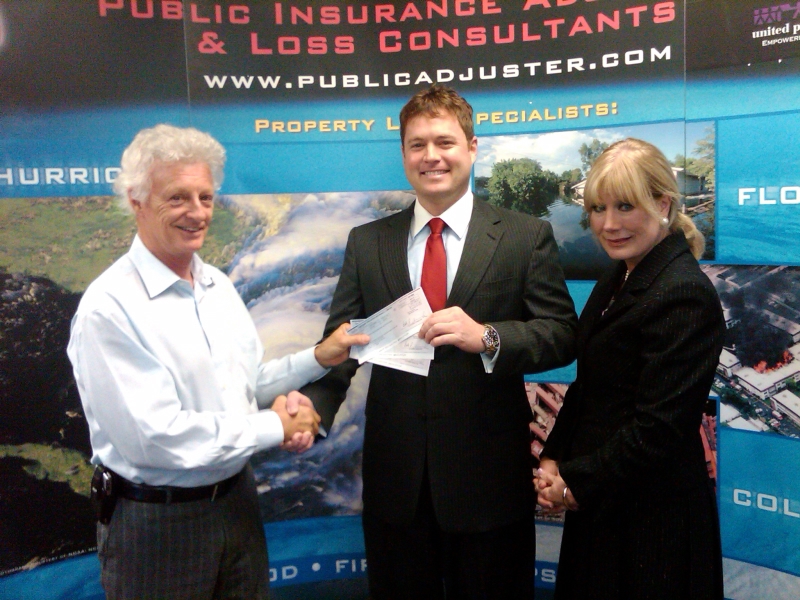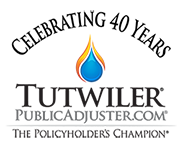Most people would not know. Some take whatever offer is made as they do not know what or how to ask for what they are entitled to. The claim adjusting process is part art form and science. Most claims are negotiable as to both scope and price of a loss. While much of the claim adjusting process is driven by computer programs and spread sheets, keep in mind that someone has to enter all this data to get these reports. Adjusting is like a business. Buy low, sell high. While some of my colleagues on the other side may disagree I cannot recall a loss where the insurance company paid on the highest estimate. It always seems to be the lowest!

Public adjuster Nick Chase at Tutwiler was fantastic! Insurance company refused to pay, Nick went to work, and I now have check in hand! Don’t accept anything less.
– Homeowner
Understanding How To Protect Your Property Insurance Claim
The steps you take, the language you use, and the documentation you provide to substantiate your claim can all play a part in how well protected you will be if your claim is denied and you have to fight for a fair settlement. Here are just a few things you can do to protect your claim:
Start Before the Loss: Document the condition of your property with photos. Make sure all important documents including your insurance policy are stored in a safe and accessible place, preferably protected from water, fire and other hazards. Make sure you understand your responsibilities under your insurance policy. Most importantly, have a plan in place for dealing with any damage contingency. This is especially true for commercial businesses that should have a disaster plan in place. Tutwiler & Associates offers a Pre-Loss Inspection Service that will make sure businesses and property owners are prepared to meet the requirements of an insurance claim.
Attorney or Public Adjuster?: If you have a new claim or one where the insurance company is not cooperating or being responsive, our opinion is that a public adjuster is your best first option. Public adjusters are trained to properly estimate, file and negotiate your settlement. At Tutwiler & Associates, we settle 94% of our claims (on average) without litigation. And, our fees are less, helping you keep more of your settlement. In cases where your claim is denied and we have exhausted all options we supply our clients with a list of prominent attorneys who specialize in insurance litigation. See what one insurance law firm says about when to choose a claims professional. Ultimately the choice is yours and you should do what you are most comfortable with.
Take Photos: Once everyone is safe, this is one of the first things you can do to document the damage. If we were to point to the number one thing a policyholder should do after a loss once life, health and safety issues are satisfied, it would be to photograph all damages as well as all areas of the insured property that were impacted by the loss event. Often losses are settled in conference rooms, mediation forums, and sometimes in a courtroom. As the old saying goes, a picture is worth a thousand words. Having photos to dispute the other side’s position can be powerful and result in getting the payment you deserve.
Find Areas of Agreement First: Another area to help protect your claim is to try and reach agreements on as many issues as you can with the adjusters sent out by the insurance company. It is important that any agreements reached be followed up with written correspondence to confirm what was said, by whom, and about what. Our experience has been that your loss may have multiple adjusters involved at different times. So it is important that you maintain a file with all letters and notes that were used to confirm agreements or positions that were taken over the course of a claim adjustment.
Be Mindful of Salvage Issues: Understand and protect your interest in salvage rights. While certain items may be damaged to the extent that they cannot be restored to their pre-loss value, they may still have significant value to others in a salvage market. You may have the rights to salvage or the money it may bring if sold by a professional salvage firm. Case in point: Hurricane Ivan destroyed a building that had as its tenant a very high-end ladies apparel store. The damage to the building was caused by the combination of flood waters and wind which blew open part of the walls and destroyed the roof. As two different adjusters were involved, one for the wind and the other for flood, we discussed and got agreement that any and all salvage was to belong to the insured. This was followed up with confirmation letters. Much later in the adjustment, the wind carrier tried to take a credit deduction for salvage from the final settlement. Fortunately, our letter protecting the client quickly settled this issue, much to the dissatisfaction of the insurance company examiner trying to get a windfall financial recovery for his employer.
Wind vs. Flood: As a result of the recent hurricanes and the litigation that has resulted when both wind and flood act together to cause a loss (concurrent causation) and the language in your insurance policy (the anti-concurrent causation exclusion), we know that going forward the policyholder will have the burden to prove what peril caused what part of the loss. This is known in the industry as a ” slab loss” where nothing is left except for the building slab. When the loss is a total loss and involves both wind and flood, you can expect the wind carriers to require that you have some proof of how much your damage was caused by the wind. This presents a problem for policyholders, given their first concern should be life, health, and safety issues. Now it will be how to document the loss as it happened. Remember the importance of photos before and after the loss. Photos of debris in trees and other things on the property can make a big difference in your ability to collect what is owed on your loss.
Beware of What You Sign: Be very cautious about signing any authorization or assignment forms pressured on you after your loss by contractors. While you certainly have an obligation to mitigate your loss, you should take the time to read and understand the forms that vendors sent out by your insurance company or who just show up trying to get your business. If emergency services are required, it is important to try and get all parties to agree on the scope of work and price of the services to be performed. Avoid the situation that we often see where the carrier refuses to pay a bill you submit claiming that the price is inflated and the scope too wide. Because you alone authorized the work, they require you to pay for it. This often results in the service provider putting a lien on your property. Get agreements in writing on the front end!
Be Careful on How You Value Your Loss: Another common mistake policyholders make when trying to handle their own claim is they often will document their loss up to what they think the limit of their policy coverage is. This is a big mistake for a number of reasons. First, any numbers you submit are subject to be adjusted to an actual cash value amount (depreciation taken). Even if your losses exceed your coverage, you should fully determine the loss as you may have some benefits available under the U.S. tax code as an uninsured tax deduction. Also, part of the loss may be the result of someone else’s negligence, such as a defective product that caused a fire. In these cases, your insurance company may pursue subrogation which may result in you recovering your uninsured losses provided they were properly documented.
A special note is in order for Florida homeowners. As the law now stands, in September 2010 an “admitted” homeowner’s insurance carrier cannot take depreciation on personal property losses. Commercial claims and surplus lines insurers can and probably will continue to take depreciation on contents/business personal property items.
Remember keep your eye on the ball, the money ball. You only have so much coverage in your policy and any money spent will reduce the limit that is available to you for your loss. If there are questionable expenses the insurance company wants to incur in your claim, ask or demand they be paid out of claim expenses which is on their side of the ledger and not out of your policy limits.
If you feel you need to file an official complaint regarding your insurance claim contact the Florida Consumer Helpline.
FAQs About Protecting Your Insurance Claim
Most businesses should primarily be concerned about resuming operations. Customers are depending on you, contracts are in place, and competitors are looking to grab market share. Plans are changed and new goals may need to be set. Businesses with employees depending on them for their livelihood have a heavy burden following a loss. Getting the business up and running is priority number one. Running a business and managing an insurance claim is inefficient and non-productive. A business needs a professional claims adjuster on their side just as they need legal and accounting help.
Consider the benefits of getting a professional public adjuster involved. Don’t let yourself be taken advantage of in an unfamiliar insurance adjusting process. You probably have more important life details to deal with during a loss rather than dealing with the demands of a claim.
Insurance companies are legitimate business and just like any other business some are good and some are not so good. The insurance company sends out adjusters and others on their behalf. These folks are representing the insurance company. You cannot serve two masters in this world so the biggest mistake policyholders make it to assume their best interests are being represented or they try and represent themselves. It all starts at the beginning, the policyholders take a very big chance by starting the adjusting process on their own.
This is something often overlooked by the new landlords the housing mess has created. If a private home is rented, and as a result of that rental there is a loss, the insurance carrier may very well raise a coverage issue and could deny the claim. Not only will the insurance application play a part (what did the property owner say the home was to be used for when they applied for insurance) but also the language in the policy will be a factor such as exclusions for business operations etc. Anyone going down this road looking for a short term profit should have a conversation with their insurance agent including providing them with a copy of the rental contract to review. If the agent say the house is fully covered make sure you confirm that statement in writing back to the agent.

